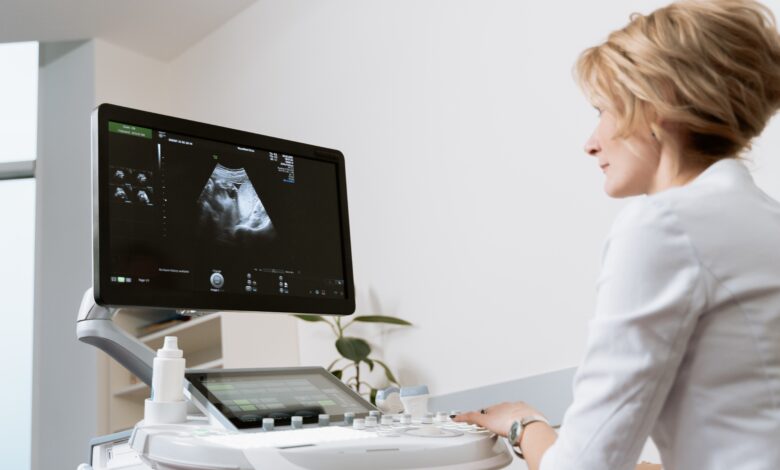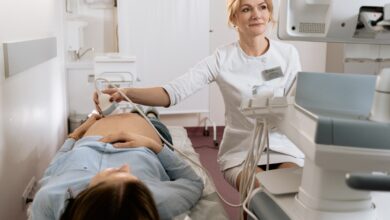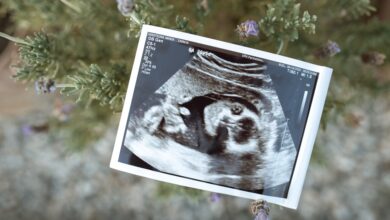
4 weeks pregnant: where is the baby?
Its growth accelerates: at the end of this first month of pregnancy, the size of the embryo at 4 weeks is 5 mm. Its general shape has also evolved: the embryonic disc, made up of three layers, has rolled up to become a cylinder with a fold at each end, one corresponding to the head, the other to the tail – which it soon to lose. The overall structure of the body takes shape.
It is also during this 4th week of pregnancy (6 weeks) that a key stage in the development of the embryo begins : organogenesis. The main organs of the fetus are in place:
· a primitive intestine takes shape as well as an outline of the liver, pancreas and gallbladder;
· at the cardiac level, the two primitive tubes merge and present dilatations in certain places: this is the outline of the heart and its atria and ventricles;
· three bulbs appear at the level of the future brain;
· the spinal cord already runs all along the future back of the fetus;
· the buds of the thyroid and pituitary glands take shape;
· the organs of the senses are set up with a draft of the inner ear, the eye and a bud of the tongue;
· the buds of the arms appear;
· the sex organs are not yet present but the sex cells are beginning to migrate to the site of development of the ovaries or testicles.
The amniotic cavity grows and now surrounds the 4-week-old fetus. The umbilical cord is not yet fully formed, but it already connects the embryo to the outer part of the egg. With the development of the baby’s blood vessels, everything is in place for the maternal-fetal circulation to begin via the umbilical cord and the placenta now formed of intervillous chambers filled with maternal blood.
In 4 weeks of pregnancy, the egg has gone from an original cell – the zygote, born from the fusion between the male and female gametes – to several million cells perfectly organized between them.
Where is the mother’s body at 4 weeks pregnant? ?
The period is two weeks late. The future mother is at 6 weeks of amenorrhea (4 SG). Pregnancy is therefore likely known. Especially since the first signs of pregnancy, still discreet or even absent during the 3rd week of pregnancy, are accentuated under the effect of pregnancy hormones:
- the chest has taken on volume, it is tense. The nipples are more prominent, the areolas darker and dotted with small glands, the tubercles of Montgomery;
- fatigue is sometimes present in the morning and can lead to drowsiness during the day;
- nausea appears or increases.
However, these pregnancy symptoms are not systematically present in all pregnant women during the 1st trimester. Some, lucky ones, will never know what pregnancy ailments are. Moreover, if pain persists, no medicine should be taken without the advice of a doctor.
From the 4th week of pregnancy (6 weeks) , the uterus begins to grow: it is now the size of a mandarin. Not enough for the pregnancy to be visible from the outside, but enough to cause minor inconvenience to the future mother:
- tightness in the lower abdomen due to overworked ligaments;
- frequent urges to urinate due to the pressure of the uterus on the bladder.
Which foods to favor at 4 weeks of pregnancy (6 weeks)?
At the end of this 4th week of pregnancy (6 weeks) , the appetite of the pregnant woman may increase and in this case, it is possible that she will gain weight. Conversely, she may be bothered by nausea and therefore have a reduced appetite and lose pounds. Nausea can be soothed by drinking ginger tea or homeopathy. It is also necessary to avoid cooking foods that may be the cause of his nausea. If the pregnant woman does not have a lot of appetite, it is not very serious, as long as she is not deficient: it is important to inform her doctor of this, however. The 4-week-old embryo is nourished by the placenta and multiple blood vessels. It finds there the essential to cover its needs in nutrients and oxygen.
However, the mother-to-be, even at 6 weeks of amenorrhea (4 SG) , must consume certain foods to prevent possible dietary deficiencies. She needs folic acid and vitamins. They are found in fruits and vegetables, raw or cooked. Care must be taken to wash them carefully, to avoid toxoplasmosis: a dangerous parasite for the embryo. Steaming is recommended for maximum benefits. Regular excesses of food are to be avoided. The consumption of bad fats (cakes, sweets, fast food, etc.) is not recommended during pregnancy, even if the pregnant woman can allow herself a culinary pleasure from time to time.
The mother-to-be must continue to have a healthy diet, thanks to balanced meals and good hydration.
What not to forget at 6 SA
At 6 weeks of amenorrhea (4 SG) , and if it hasn’t been done yet, it’s time to make an appointment with your gynecologist or a midwife for the first prenatal visit (before 15 SG). This is an opportunity to think about the type of follow-up you want for this pregnancy: follow-up with your usual gynecologist, in town; at the hospital where you know you already want to give birth; a more personal follow-up with a midwife in the office. It will always be possible to change later, but it is better to ask yourself these kinds of questions early, especially since in some maternities, registration must be done from the first month of pregnancy.
- bridge
- Allergies (overview)
- Achluophobia : all about the fear of the dark
- At what age can you do bodybuilding?
- Fatigue in the morning: causes and remedies
Advice
One month pregnant, it is common to experience ambivalent feelings. There is the joy of being pregnant of course, but also the anxiety that this news, which announces a big change in life, can cause. Moreover, during the 1st trimester, the hormonal climate, pregnancy nausea and fatigue do not help the future mother to feel at her best. The fear of miscarriage can also be very present in some future mothers, especially in the event of a history of this pregnancy accident. Do not hesitate to talk about these different feelings with an attentive ear.
The pregnant woman can keep a pregnancy notebook week by week in which she notes her various impressions, her questions and even her doubts. It helps him release and control his emotions. She will feel less overwhelmed. In addition, during a medical appointment, she will not forget to ask any questions.










